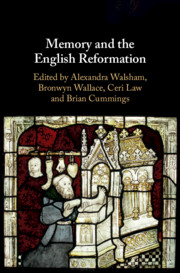Book contents
- Memory and the English Reformation
- Memory and the English Reformation
- Copyright page
- Dedication
- Contents
- Figures
- Contributors
- Preface and Acknowledgements
- Abbreviations
- Introduction
- Part I Events and Temporalities
- Part II Objects and Places
- Part III Lives and Afterlives
- 13 Compromise Refashioned
- 14 History, Heresy and Henry V
- 15 The Letters of the Martyrs
- 16 Competing Lives and Contested Objects
- 17 Visual Memory, Portraiture and the Protestant Credentials of Tudor and Stuart Families
- 18 Legends, Shrines and Ruined Tombs
- Part IV Rituals and Bodies
- Index
15 - The Letters of the Martyrs
Remembering and Reclaiming the Apostolic Form
from Part III - Lives and Afterlives
Published online by Cambridge University Press: 30 October 2020
- Memory and the English Reformation
- Memory and the English Reformation
- Copyright page
- Dedication
- Contents
- Figures
- Contributors
- Preface and Acknowledgements
- Abbreviations
- Introduction
- Part I Events and Temporalities
- Part II Objects and Places
- Part III Lives and Afterlives
- 13 Compromise Refashioned
- 14 History, Heresy and Henry V
- 15 The Letters of the Martyrs
- 16 Competing Lives and Contested Objects
- 17 Visual Memory, Portraiture and the Protestant Credentials of Tudor and Stuart Families
- 18 Legends, Shrines and Ruined Tombs
- Part IV Rituals and Bodies
- Index
Summary
The English Protestant martyrs’ letters, collected and memorialised in Foxe’s Acts and monuments (1563, with more letters added to each subsequent edition in 1570, 1576 and 1583) and in Coverdale and Bull’s Certain most godly, fruitful, and comfortable letters of such true saintes and holy martyrs of God (1564) were a crucial means by which the Tudor Reformation came to be remembered. This chapter argues that these monuments celebrated Protestant apostolic epistolary style in response to the Marian bishop John Christopherson’s direct attack on the presumptuous deployment of the form by the martyr letter writers, helping to shape a polemical context of epistolary memorialisation.This chapter uses the letters of Bishop John Hooper and Lawrence Saunders to examine the role of the literary biblical form of the apostolic letter (letters modelled in the New Testament by the apostles) in memorialising the Protestant Reformation in England and propagating its legacy. It also aims to demonstrate how the deployment of the apostolic model resisted the idea that the martyrology was simply historical commemoration. Radical and nonconformist Protestants across the seventeenth century continually appropriated these apostolic letters, asserting a distinctly Reformed epistolary tradition and inheritance and a distinctly Reformed interpretation of ongoing apostolic succession.
Keywords
- Type
- Chapter
- Information
- Memory and the English Reformation , pp. 286 - 302Publisher: Cambridge University PressPrint publication year: 2020



